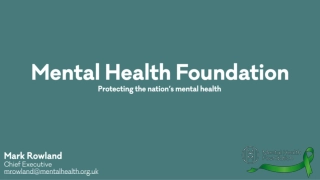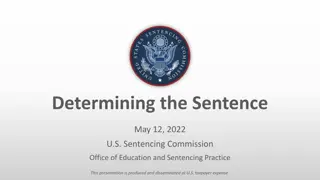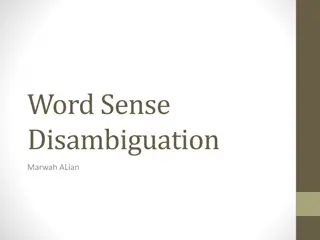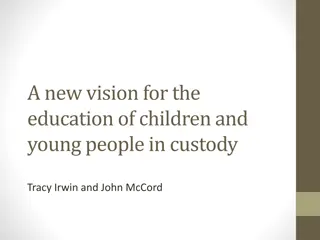Understanding Mental Health in Custody: Challenges and Approaches
Mental health challenges in custodial settings manifest through a higher prevalence of disorders, addiction issues, and learning difficulties. Research highlights the complexities faced by individuals with co-existing vulnerabilities such as unstable housing, trauma, and limited life skills. Recognizing the need for individualized care, addressing mental health in custody requires a holistic approach that considers past experiences and traumas. The significance of identifying and supporting these individuals to prevent recidivism and promote overall well-being cannot be overstated.
Uploaded on Sep 11, 2024 | 0 Views
Download Presentation

Please find below an Image/Link to download the presentation.
The content on the website is provided AS IS for your information and personal use only. It may not be sold, licensed, or shared on other websites without obtaining consent from the author. Download presentation by click this link. If you encounter any issues during the download, it is possible that the publisher has removed the file from their server.
E N D
Presentation Transcript
Toward Trauma Responsive Custody: Supporting Mental Health Dr Maggie Mc Govern Senior Psychologist Irish Prison Service
What do we mean by Mental Health? Centre for Mental Health 2017 Centre for Mental Health 2017
Mental Health in Prison Mental Health in Prison Research is consistent: Higher prevalence of mental health difficulties Higher rates of learning and communication difficulties and addiction problems (Durcan & Zwemstra, 2014) Complexity is typical, co-morbidities expected Mental health concerns present alongside several other concurrent vulnerabilities (Durcan, 2008) Unstable housing Debt (inside and outside prison) Poor general health Trauma Limited life and social skills Addiction/problematic substance use Learning difficulties/disabilities History unemployment Limited education
Mental Health in Custody Mental Health in Custody 90% of prisoners suffered from a mental illness, addiction or a personality disorder 70% of prisoners had two or more such problems (Large Scale UK Study 3000 interviews : Singleton, Meltzer, Gatward, 1998) Rates of Personality Disorder of particular note: 4-11 % of general population 60 70% prison population Historically seen as untreatable Trauma Excluded from ROI Mental Health Act (2001)
Seeing the Individual Seeing the Individual Individualised approach essential Health and care needs Assessment and management Gatherer, Ataby, Hariga, 2014
Seeing the Bigger Picture Seeing the Bigger Picture Adverse Childhood Experiences and Trauma: 468 MALES Welsh Prison (Ford et al., 2019)
Seeing the Big Picture Seeing the Big Picture Women in custody: up to 90% have experienced physical or sexual violence ACES - risk of poor health including mental illness, early development of chronic health conditions, premature mortality, addiction, poor educational attainment, violence and crime 4 or more ACEs - 15 times more likely to have perpetrated violence in the last year - 20 times more likely to be incarcerated (Feletti, 1998) (Ford et al., 2019) Exposure is higher among people with intellectual disabilities when compared to peers without such disabilities (Wigham & Emerson, 2015) A prison problem? A public health issue? (Saavkvine, 2013)
Dose-Response Correlation not causation: The interface between nature and nurture: epigenetics, neurobiology and stress Behavioural Biology: Sapolsky
Prison & Trauma Prison & Trauma While many benefit from basic prison care as well as specialist intervention (Gatherer, Ataby, Hariga, 2014) Risk of re-traumatisation and exacerbation of mental health and other difficulties Challenging environment Vulnerability to humiliation and violence- over-crowding of concern (Gatherer, Ataby, Hariga, 2014) (Miller & Najavits, Prison is for perpetrators ? 2012; Widom & Maxfield, 2001) Imprisonment of people with severe disabilities and ill health Diversion and coordination of care with community and specialist services UN Convention on the Rights of Persons with Disabilities (CRPD)
Trauma: Problematic Coping Trauma: Problematic Coping Coping strategies: At one point, they were effective In some settings they are effective People need to learn new strategies but no one can learn when on high alert Prison can be a place to learn and practice new coping strategies Trauma need not, and does not define a person McKechnie, 2014
A Trauma Informed System A Trauma Informed System realizes the widespread impact of trauma and understands potential paths for recovery; recognizes the signs and symptoms of trauma in clients, families, staff and others involved within the system; responds by fully integrating knowledge about trauma into policies, procedures, and practices, seeks to actively resist re-traumatisation. SAMHSA JULY 2014
Trauma Informed & Trauma Specific Trauma Informed & Trauma Specific Learning Environment: Targeted Supports and Interventions: Safe Predictable Calm Trusting relationships Opportunity to try new things Understanding Lack of judgement Psychology Forensic Mental Health Team (Psychiatry) Addiction Services Specialist Counselling (eg. sexual trauma) Probation Services Self-Development Programmes & Peer Lead Support Services Investing in Community Step- Downs and Supports Education and Training
Six Principles of Trauma Informed Approach Six Principles of Trauma Informed Approach 1. Safety 2. Trustworthiness and Transparency 3. Peer Support 4. Collaboration and Mutuality 5. Empowerment, Voice and Choice 6. Cultural Historical and Gender Issues Making it meaningful.. (Jewkes et al., 2019).
IPS Psychology Service Strategic Actions 2019-2022 Porporino (2015) recommendations: Establish a multi-disciplinary model of mental healthcare In conjunction with IPS Healthcare, National Forensic Mental Health Service & Allied Services Continue to build on best practice offence specific interventions Develop a best fit model of trauma informed correctional care Interventions for prisoners who deny sexual violence Ratios of Psychologists to People in Custody 1 : 311 (End Dec 2019) 1 : 150 (recommended)
Thank you Thank you
References & Resources Creating trauma-informed correctional care: a balance of goals and environment; Miller & Najavits (2012) Eur J Psychotraumatol, 2012) https://www.ncbi.nlm.nih.gov/pmc/articles/PMC3402099/ McKechnie (2015) Trauma and the impact on female offending (PDF available online- helpful summary- source) Exposure to Trauma among Women Offenders: A Review of the Literature; Tam & Derkzen (2014) Correctional Service of Canada, August 2014) Gatherer, Atabay, Hariga (2014) Prisons and health (WHO, UNODC, ICRC) Chapter 17. Prisoners with Special Needs December 2014 In book: Prisons and health (WHO, UNODC, ICRC Publisher: WHOISBN 978 92 890 5059 3 Editors: WHO Singleton N, Meltzer H, Gatward R. Psychiatric morbidity among prisoners in England and Wales. London, Office for National Statistics, 1998. Durcan G. From the inside. Experiences of prison mental health care. London, Sainsbury Centre for Mental Health, 2008 (http://www.centreformentalhealth.org.uk/pdfs/From_the_Inside.pdf, accessed 28 November 2013).
Ford, Kat & Barton, Emma & Newbury, Annemarie & Hughes, Karen & Bezeczky, Zoe & Roderick, Janine & Bellis, Mark. (2019). Understanding the prevalence of adverse childhood experiences (ACEs) in a male offender population in Wales: The Prisoner ACE Survey. Wigham, S., Emerson, E. Trauma and Life Events in Adults with Intellectual Disability. Curr Dev Disord Rep 2, 93 99 (2015) Jewkes, Y., Jordan, M., Wright, S., & Bendelow, G. (2019). Designing 'Healthy' Prisons for Women: Incorporating Trauma- Informed Care and Practice (TICP) into Prison Planning and Design. International journal of environmental research and public health, 16(20), 3818. https://doi.org/10.3390/ijerph16203818 Niki A. Miller & Lisa M. Najavits (2012) Creating trauma-informed correctional care: a balance of goals and environment, European Journal Of Psychotraumatology, 3:1, DOI. SAMHSA: Substance Abuse and Mental Health Services Administration U.S. Department of Health and Human Services Guidance for Trauma Informed Approach https://store.samhsa.gov/shin/content/SMA14-4884/SMA14-4884.pdf























